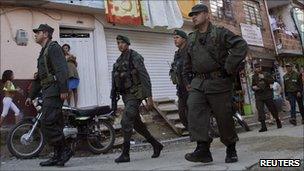New armed drug-trafficking groups menace Colombia
- Published

Colombia's police and army have long struggled to combat the drug trade
Armed groups of drug-traffickers have overtaken left-wing rebels as Colombia's main source of violence, local think tank Indepaz says.
The groups have emerged since the demobilisation of the illegal United Self Defence Forces of Colombia (AUC) paramilitaries.
The think tank says they are present in 29 of Colombia's 32 provinces.
It based its findings on its own field work as well as data from government agencies and the media.
The demobilisation of the AUC in 2006 was one of the main successes of former President Alvaro Uribe, who left office in August.
But Indepaz said a dozen or so new narco-paramilitary groups had quickly replaced the AUC in much of Colombia.
Extreme violence
With names like the Black Eagles and Rastrojos, they combine control of cocaine production and smuggling with extreme violence, though with less of a political agenda.
Indepaz estimates they have as many as 13,000 members.
The 大象传媒's Jeremy McDermott in Colombia says the cocaine trade is still the principal motor of the armed conflict, providing hundreds of millions of dollars in funding for the illegal armed groups
The AUC was formed by landowners and drug lords to battle the left-wing rebels of the Revolutionary Armed Forces of Colombia (Farc) and the National Liberation Army (ELN).
It was also heavily involved in drug trafficking and committed widespread human rights abuses against civilians, including massacres and forced displacement.
More than 30,000 paramilitaries were demobilized and many leaders extradited to the US to face drugs charges.
But the legal process underlying the demobilisation has been criticised for allowing many to escape punishment for serious crimes.